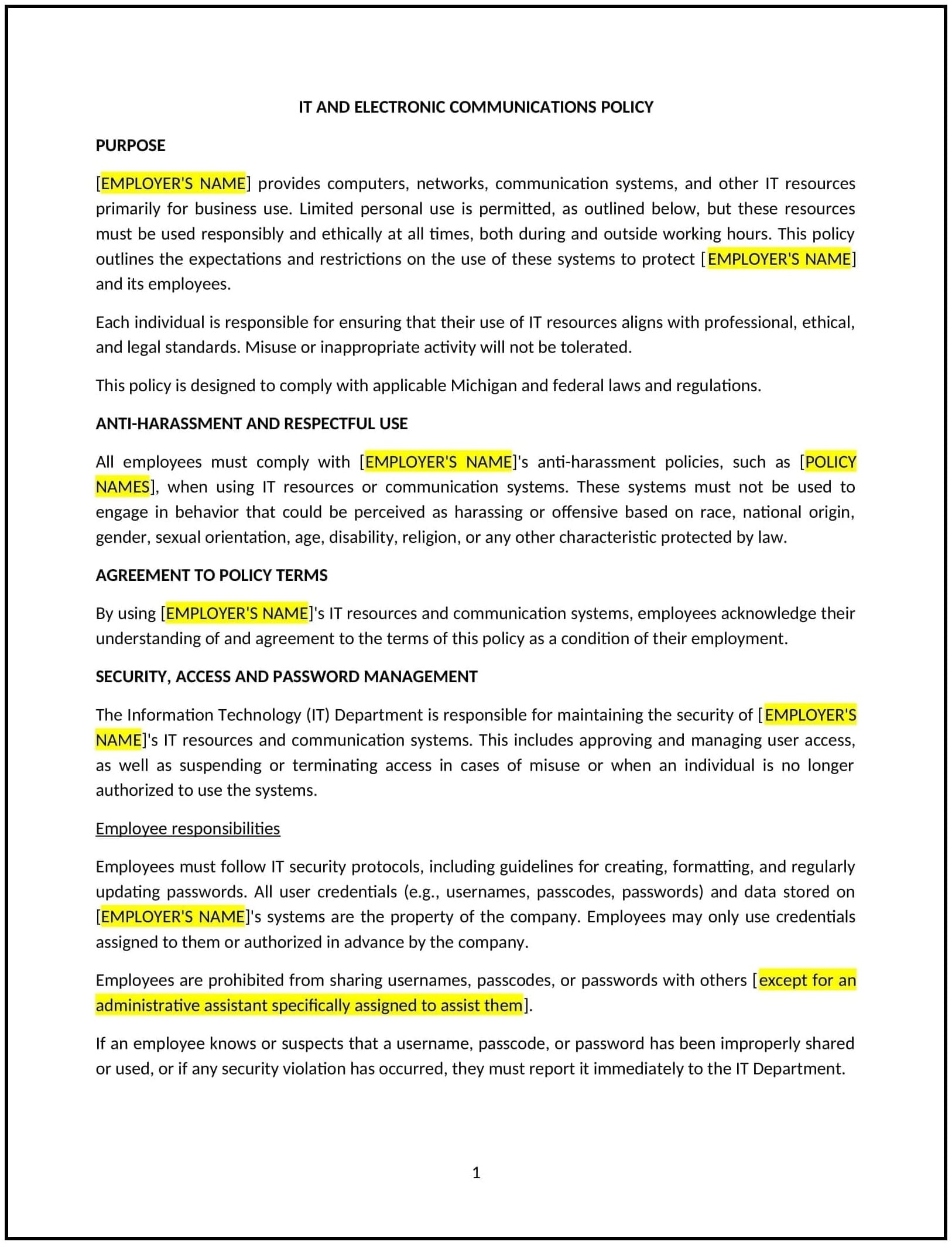IT and electronics communications policy (Michigan): Free template
Got contracts to review? While you're here for policies, let Cobrief make contract review effortless—start your free review now.

Customize this template for free
IT and electronics communications policy (Michigan)
An IT and electronics communications policy outlines the guidelines for the proper use of the company’s IT resources and electronic communications, such as email, internet, and company-issued devices. This policy helps businesses in Michigan ensure that their IT systems are used efficiently and securely, while safeguarding the privacy of employees and the business’s sensitive data.
By adopting this policy, businesses can minimize the risks associated with cyber threats, maintain productivity, and ensure that electronic communications are used appropriately and responsibly.
How to use this IT and electronics communications policy (Michigan)
- Define acceptable use: Clearly specify what constitutes acceptable use of company-provided IT resources, including devices, email, internet access, and other electronic communication systems. Set guidelines on personal use, prohibiting activities like illegal downloads, inappropriate websites, or unauthorized sharing of sensitive data.
- Set email and communication standards: Establish rules for professional email and communication, such as the use of company email for business-related purposes only, restrictions on using company emails for personal communications, and prohibitions on sending offensive or inappropriate content.
- Address data security: Ensure that employees understand the importance of protecting sensitive business data when using IT resources. Include guidelines on password security, encryption, and secure methods for sharing and storing confidential data.
- Implement monitoring procedures: Specify how and when the business may monitor the use of IT resources and electronic communications, such as monitoring email usage, internet browsing, or device activity, to ensure compliance with company policies and detect any misuse or potential security breaches.
- Provide guidelines for remote work: Outline expectations and security protocols for employees working remotely, including using secure networks, virtual private networks (VPNs), and company-approved software for communications and file-sharing.
- Set rules for device usage: Provide guidelines for the proper use of company-issued devices, such as laptops, smartphones, and tablets, including restrictions on installing unauthorized software, accessing inappropriate content, or using devices for personal purposes during work hours.
- Address consequences of policy violations: Specify the potential consequences for violating the policy, including disciplinary action or termination, depending on the severity of the violation.
- Ensure compliance with laws and regulations: Ensure that the policy complies with relevant state and federal laws, including data privacy regulations, and that employees understand the legal implications of their actions when using company IT resources.
Benefits of using this IT and electronics communications policy (Michigan)
This policy provides several key benefits for Michigan businesses:
- Promotes secure IT practices: The policy helps employees understand the importance of cybersecurity and encourages responsible use of company resources, reducing the risk of data breaches, cyberattacks, and unauthorized access to sensitive information.
- Increases productivity: By establishing clear guidelines for the use of company devices and communications, businesses can minimize distractions, ensure that IT resources are used effectively, and maintain a productive work environment.
- Protects company data: With clear protocols for data security, the policy helps safeguard company and customer data from unauthorized access, theft, or loss, reducing the risk of financial and reputational damage.
- Ensures legal compliance: The policy helps businesses comply with relevant laws and regulations, such as data privacy laws and cybersecurity requirements, protecting the business from potential fines, lawsuits, or other legal consequences.
- Enhances employee accountability: A clear IT and communications policy sets expectations for employee behavior when using company resources, leading to a more accountable and professional work environment.
Tips for using this IT and electronics communications policy (Michigan)
- Communicate the policy: Ensure that all employees are aware of the IT and electronics communications policy by including it in the employee handbook, during onboarding, and through regular reminders about expectations for the use of company resources.
- Provide training: Offer training for employees on the proper use of IT resources and electronic communication systems, emphasizing data security practices, acceptable usage, and the consequences of policy violations.
- Monitor usage appropriately: Regularly monitor the use of company devices and communication systems to ensure compliance with the policy, while respecting employee privacy and legal boundaries.
- Maintain security protocols: Ensure that employees follow security protocols, such as using strong passwords, encrypting sensitive data, and utilizing VPNs when accessing company resources remotely.
- Review the policy regularly: Regularly review and update the policy to ensure it stays current with emerging cybersecurity threats, new technologies, and changes in relevant laws and regulations.